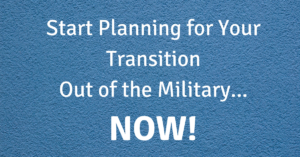INSIDE THE 
NEWS + ADVICE
Maximize Your Military Transition Success
 If you asked an expert, the ideal time to think about your post-military career starts when you start your military career. Smart – but few actually do this. So how do you create your future to achieve your goals?
If you asked an expert, the ideal time to think about your post-military career starts when you start your military career. Smart – but few actually do this. So how do you create your future to achieve your goals?
While Serving
The earlier you start looking forward to both your military career and your follow-on career, the easier your transition will be when the time comes. If it is too late for you to think this way because you are in transition, mentor a younger person to help them do so.
One of the most critical things you can learn in the military is the value of continuous learning. The military does this exceptionally well and provides a wide range of options to keep learning and growing. On the ‘outside’ you will most often have to do this for yourself. And if you do not develop this skill, your future is bleak.
Many military members pursue a college or post-graduate degree while on active duty. Sadly, too many choose their school and major for the ease it offers in checking off that box for their military career. I regularly hear transitioning military complaining that their degree is not valued by employers or that they should have majored in something that provided a better career path. A degree is a big investment of your time and energy, even if it is fully paid for by your service. Make sure yours helps you move forward in future career terms. Be sure that the college you choose also provides excellent career resources now and for alumni – this really helps in your transition!
Read Richard Bolles “What Color is Your Parachute?” This book is available in regularly updated versions as well as specific versions for veterans and other groups. It doesn’t matter so much which version you choose. It does matter that you work through the entire process in the book. This will give you a great foundation to build your future.
Keep in contact with other military and civilians you meet along your military career. These people are the basics of your first professional network. Those ahead of you on the career path can help you understand your future. Those in the same stage or more junior provide good resources and information to increase your value. These human connections are nurtured by the back and forth of what you can learn about and do for each other. They enrich both sides.
Transition Preparation
The services provide a range of transition support. But it is still your transition and you own the results. I have often seen two people who went through the same program at the same time but have totally different levels of readiness to transition. That’s on you, not on how good or bad the program trainers are.
Start working your way through all the transition process has to offer as early as possible. You need to learn what all your options and resources are. Don’t skimp on the financial planning and resilience learning portions of the process – these are critical areas where far too many people are not prepared and panic sets in as they do not have a job quickly after their separation date. Whether you expect to need them or not, learn about your VA benefits and how to access them. In many places, area veterans groups also provide volunteers to explain their services which support the VA programs.
Bring your spouse or partner to as many of the program as possible. This helps you both learn about your options and discuss them effectively.
If at all possible, take the DOL Employment part of the program twice – and better yet do so at two different locations if you can. This program is overwhelming to many. There is a lot of information to learn and understand. Much of it will be new to you and it takes attention and effort to ‘get it’. Take this training as far in advance as possible the first time. Do not let yourself get caught up in the demands of your job so much that you neglect your own future. Some commanders are better than others on making this work but it is up to you to push for what you need.
The Employment section of the transition program will not provide you with a job! It will demonstrate tools and tactics. What you can realistically expect in such a short program is that you have the opportunity to learn the basics of the job search process and resources available to assist you. It is your responsibility to
- Take advantage of all the services offered,
- Define your personal and professional goals,
- Build on your existing network in person and online to support your future,
- Do the ‘real world’ research necessary to understand job options, compensation, and all aspects of job search realistically, and
- Build a plan for your transition to achieve your goals and then execute on the plan.
The people who run the employment aspects of the transition program often supplement the required curriculum with outside resources. When available, take advantage of all such extras to improve your success in transition. Some common ones include:
- Local employer panels discussing what hiring managers look for and what the corporate hiring process looks like. Even if you are relocating, this is good info.
- HR professionals often volunteer to provide resume reviews, mock interview practice, and coaching on career decisions and job search tactics.
- Experts in social media, job fairs, and specific careers volunteer to expand on the basic information in the course and provide insight on current trends in job search.
As you go through the employment portion of the process you will find diverse opinions on the job search process. This is a challenge for many people, not just military in transition. One would like certainty in what constitutes a great resume, how to get from interest in a position to a job offer, and all the rest.
Hiring is very different in a large organization and a start-up, between government contractors and other private sector employers, in regulated industries and those which are not, in federal vs state vs local governments – just to list a few variables. Hiring managers within an organization also often differ in their approach. Recruiters reflect the hiring manager’s demands.
Your goal is to learn as much as you can during transition so that these differences do not hinder you.
Military transition can be an exhilarating time with new options and choices. For many it also is a stressful time as they do not understand the process and thus make mistakes which hinder their success. This is your future we are discussing – invest your time and energy to learn as much as you can in the transition process for your own personal success in this next life stage.
 Patra Frame is ClearedJobs.Net’s HR Consultant. She is an experienced human resources executive and founder of Strategies for Human Resources. Patra is an Air Force veteran and charter member of the Women in Military Service for America Memorial. Follow Patra on Twitter @2Patra.
Patra Frame is ClearedJobs.Net’s HR Consultant. She is an experienced human resources executive and founder of Strategies for Human Resources. Patra is an Air Force veteran and charter member of the Women in Military Service for America Memorial. Follow Patra on Twitter @2Patra.

